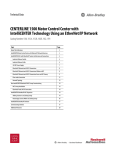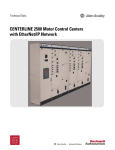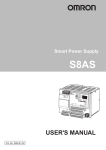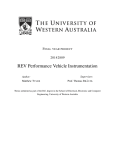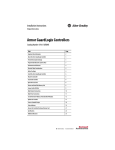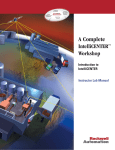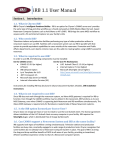Download 2100-TD031 - Literature Library
Transcript
Technical Data CENTERLINE 2100 Motor Control Center with IntelliCENTER Technology Using an EtherNet/IP Network Bulletin Number 2100 Topic Page About This Publication 2 IntelliCENTER Motor Control Center with EtherNet/IP Network Overview 3 IntelliCENTER MCC with EtherNet/IP System Architecture and Connections 5 Industrial Ethernet Switch 5 Industrial Ethernet Cable 8 24V DC Power Supply 9 EtherNet/IP Network and 24V DC Connections 10 EtherNet/IP Network and 24V DC Connections Within a Shipping Split 10 EtherNet/IP Network and 24V DC Connections Across Shipping Splits 16 Cable Labels for MCC Lineups with Unit-mounted Ethernet Switches 22 Ethernet Cable Transitions for MCC Lineups with Unit-mounted Ethernet Switches 23 Plant-wide Connections 25 Network Topology 26 New IntelliCENTER EtherNet/IP MCC Lineup Commissioning 28 IntelliCENTER EtherNet/IP MCC Expansion 28 Adding EtherNet/IP IntelliCENTER Sections to an Existing Lineup 29 Adding or Rearranging EtherNet/IP IntelliCENTER Units Within an Existing Lineup 30 IntelliCENTER EtherNet/IP Software 33 MCC Commissioning Checklist 34 Additional Resources 37 CENTERLINE 2100 Motor Control Center with IntelliCENTER Technology Using an EtherNet/IP Network About This Publication This document is for engineers or technicians directly involved in the installation, connection, commissioning, energizing, and maintenance of the CENTERLINE® 2100 Motor Control Center (MCC) with EtherNet/IP™ network. See MCC Commissioning Checklist prior to applying power to the MCC. This document provides the following information about CENTERLINE 2100 MCCs with EtherNet/IP network: • System architecture • Factory installed components • EtherNet/IP network connections • 24V DC power connections commissioning • Expansion of the existing lineup • Integration of the EtherNet/IP network into your plant-wide network If you do not have a basic understanding of the CENTERLINE 2100 MCC with EtherNet/IP network system architecture, see the IntelliCENTER EtherNet/IP Motor Control Centers Reference Manual, publication MCC-RM001. This table defines abbreviations that are used in this manual. Table 1 - Terminology 2 Abbreviation Full Term Definition MCC Motor Control Center An assembly of one or more enclosed sections that contains motor control units and have a common power bus. IMC Intelligent Motor Control Motor Control devices that can connect to a communication network. ODVA Open DeviceNet Vendors Association Organization that standardizes communication networks that use CIP among other technologies. CPwE Converged Plantwide Ethernet Rockwell Automation and Cisco initiative to standardize Ethernet network implementation across the manufacturing and enterprise networks. REP Resilient Ethernet Protocol Redundant network topology/feature in the Stratix 5700™ switch. DHCP Dynamic Host Configuration Protocol Networking protocol that is used to distribute network parameters such as IP addresses to connected devices. Rockwell Automation Publication 2100-TD031C-EN-P - September 2015 CENTERLINE 2100 Motor Control Center with IntelliCENTER Technology Using an EtherNet/IP Network IntelliCENTER Motor Control Center with EtherNet/IP Network Overview The IntelliCENTER® EtherNet/IP MCC couples the reliability of the CENTERLINE 2100 MCC with robust EtherNet/IP network, Intelligent Motor Control (IMC) devices, and intuitive IntelliCENTER software to deliver an effective and integrated motor control solution. The IntelliCENTER EtherNet/IP MCC is an assembly of one or more enclosed vertical sections that are powered by a common power bus. Each section can contain multiple intelligent motor control units. The MCC assembly has two types of unit construction: • Plug-in unit construction: Units that can be inserted and removed from an MCC section. Plug-in units typically have a lower current capacity than frame-mounted units. • Frame-mount unit construction: Units that are built with frame-mounted construction are permanently mounted to an MCC section and cannot be inserted or removed. Frame-mounted units typically have a higher current capacity than plug-in units. The MCC section can have two types of built-in wireways where the wiring connections are made inside the MCC enclosure. The built-in wireways typically contain the following components, which could vary based on customer requests. See the MCC one-line drawing included with your MCC for actual MCC setup: • Top and bottom horizontal wireways can contain the following: – Motor cable routings – Stratix 5700 switch – EtherNet/IP cable routings – 24V DC power supply wiring • Vertical wireways are typically seen in sections with plug-in unit construction and can contain the following: – Wireway adapters for the EtherNet/IP network and 24V DC power that provide easy connections for IMC device connections – Industrial Ethernet cable routings – Motor cable routings The MCC section can have two different industrial Ethernet switch locations: • Top or bottom horizontal wireway-mounted Stratix 5700 switches – One Stratix 5700 switch per section, on average • Top or bottom unit-mounted Stratix 5700 switches – One or two Stratix 5700 switches per switch group – A switch group is composed of all sections, and Ethernet devices within those sections that are connected to a given Stratix 5700 switch unit – The standard switch group cannot exceed 9 sections or 24 intelligent device connections IMPORTANT You must choose one industrial Ethernet switch mounting methodology per MCC lineup. If you choose to have your industrial Ethernet switch mounted in the horizontal wireway, all of the sections within that MCC lineup must have the industrial Ethernet switch mounted in the horizontal wireway. Rockwell Automation Publication 2100-TD031C-EN-P - September 2015 3 CENTERLINE 2100 Motor Control Center with IntelliCENTER Technology Using an EtherNet/IP Network Figure 1 - Example of a CENTERLINE 2100 Motor Control Center Top Horizontal Wireway Unit Vertical Wireway Unit Bottom Horizontal Wireway Section The EtherNet/IP network is an industrial version of an Ethernet network. IntelliCENTER EtherNet/IP MCCs use the EtherNet/IP network to connect IMC devices in your application. The EtherNet/IP network provides one robust and reliable network solution for your entire factory from the control room to the MCC. The integrated EtherNet/IP network within your IntelliCENTER MCC is preconfigured, tested, and validated at the factory before shipment. The EtherNet/IP network integrates with current IT networks and lets you collect data to determine plant production, energy efficiency, and other key performance indicators and metrics. The EtherNet/IP network can accommodate a vast number of nodes and unlike other fieldbus networks has no specific node maximum. The limit varies based on the number of connections the EtherNet/IP scanner can make within the controller application, and the network topology that is implemented. The number of connections that are used by each node varies. To estimate the number of connections an Ethernet network uses, see the Advanced EtherNet/IP capacity tool embedded in the Integrated Architecture® Builder (IAB) software http://raiseinstall.rockwellautomation.com/pst-lite.html. See the IntelliCENTER EtherNet/IP Reference Manual, publication MCC-RM001, for detailed information on the EtherNet/IP network and the IntelliCENTER MCC system. 4 Rockwell Automation Publication 2100-TD031C-EN-P - September 2015 CENTERLINE 2100 Motor Control Center with IntelliCENTER Technology Using an EtherNet/IP Network IntelliCENTER MCC with EtherNet/IP System Architecture and Connections The IntelliCENTER EtherNet/IP MCC system architecture is composed of a physical infrastructure that enables the appropriate network layout and topology for MCC applications. The physical infrastructure consists of industrial Ethernet switches, industrial Ethernet cables, integrated 24V DC power, and IMC device connections. This section focuses on these topics and describes how your IntelliCENTER EtherNet/IP MCC is shipped from the factory. Industrial Ethernet Switch The IntelliCENTER EtherNet/IP MCC is designed with Stratix 5700 Layer 2 managed switches. The Stratix 5700 switch is an industrial Ethernet switch that provides a range of advanced features. With the advanced features, the IntelliCENTER EtherNet/IP MCC connects to the plant-wide EtherNet/IP network providing a reliable and robust connection. The benefits of the Stratix 5700 managed switch are explained in detail in the IntelliCENTER EtherNet/IP Reference Manual, publication MCC-RM001. The Stratix 5700 switch is factory-configured with customer defined IP addresses and subnet masks that are provided at order entry. All network connections are tested and validated during the system level test at the factory, before shipping. The IntelliCENTER EtherNet/IP MCC design that uses a horizontal wireway-mounted Stratix 5700 switch contains a 10-port or 6-port Stratix 5700 switch. See Table 2 for the Stratix™ switch types available for the IntelliCENTER EtherNet/IP MCC design that uses a unit-mounted Stratix 5700 switch. The type of Stratix switch that is installed in the IntelliCENTER MCC depends on the quantity and type of intelligent units that are installed and customer preference. Table 2 - Available Switch Sizes for Unit-mounted Stratix 5700 Switch Space Factor Stratix 5700 Size Total Ethernet Port Capacity Ethernet Device Connection Capacity Switch-to-switch Connection Capacity 0.5 Space Factor 6-port switch 6 4 2 10-port switch 10 8 2 1.0 Space Factor 6-port switch 6 4 2 10-port switch 10 8 2 20-port switch 20 (1) 16 2 Combination 10-port and 20-port switches 30(1) 24 2 (1) The 20-port switch includes two dedicated fiber Ethernet ports for switch-to-switch connections that are not used in the standard IntelliCENTER MCC design. Sections with Plug-in Units The standard IntelliCENTER EtherNet/IP MCC design can have a wireway-mounted Stratix switch or a unit-mounted Stratix switch. It can also have a different sized Stratix switch if unit-mounted. Each Stratix 5700 switch uses copper Ethernet ports for IMC device-to-switch connections and two combination ports for switch-to-switch connections. Combination ports support either fiber-optic or copper Ethernet connections. The standard design uses copper connections for switch-to-switch connections. See the Industrial Ethernet Cable section for more information. TIP Fiber-optic Ethernet cable can also be used for switch-to-switch connection. For further details on IntelliCENTER EtherNet/IP MCC switch options and switch details, see the IntelliCENTER EtherNet/IP Reference Manual, publication MCC-RM001. Rockwell Automation Publication 2100-TD031C-EN-P - September 2015 5 CENTERLINE 2100 Motor Control Center with IntelliCENTER Technology Using an EtherNet/IP Network Figure 2 - Stratix 5700 Switch Examples Copper Ports (IMC device connections) 20-port Stratix 5700 Switch 10-port Stratix 5700 Switch Combination Ports (switch-to-switch connection) IMPORTANT 9 9 10 10 The 10-port Stratix 5700 switch that is shown is catalog number 1783-BMS10CL. The 20-port Stratix 5700 switch that is shown is catalog number 1783-BMS20CL. For information on other Stratix 5700 switch catalog numbers, see the Stratix Managed Switches User Manual, publication 1783-UM007. Sections with Frame Mount Units The standard IntelliCENTER EtherNet/IP MCC design for sections with frame-mount units can have a 6-port wirewaymounted Stratix switch or belong to a switch group where the switch resides in a separate plug-in section. For sections with frame-mount units and a 6-port Stratix 5700 switch that is mounted in a wireway, four copper ports for IMC device-toswitch connections and two copper ports for switch-to-switch connections are available. For MCCs with unit-mounted Stratix 5700 switches, the IMC devices within frame-mount units directly connect to Stratix 5700 switch ports that are located in a nearby plug-in section. With a unit-mounted Stratix 5700 switch providing Ethernet connections for all IMC devices within its switch group, you are not limited to a 6-port Stratix switch as you are for wireway-mounted switches in sections with frame-mount units. See Table 2 for available Stratix 5700 switches. Figure 3 - 6-port Stratix 5700 Switch Example Copper Ports (IMC device connections) Copper Ports (switch-to-switch connection) IMPORTANT The 6-port Stratix 5700 switch that is shown is catalog number 1783-BMS06TL. For information on other Stratix 5700 switch catalog numbers, see the Stratix Managed Switches User Manual, publication 1783-UM007. For further details on IntelliCENTER EtherNet/IP MCC switch options and switch details, see the IntelliCENTER EtherNet/IP Reference Manual, publication MCC-RM001. 6 Rockwell Automation Publication 2100-TD031C-EN-P - September 2015 CENTERLINE 2100 Motor Control Center with IntelliCENTER Technology Using an EtherNet/IP Network Horizontal Wireway-mounted Stratix 5700 The typical mounting of the Stratix 5700 switch in the top horizontal wireway is shown in Figure 4. The switch can also be mounted in the bottom horizontal wireway or in a frame-mounted unit if desired. Figure 4 - Stratix 5700 Switch Top Horizontal Wireway Mounting Example Stratix 5700 Mounting Position Top Horizontal Wireway Right Side View Front View Unit-mounted Stratix 5700 Switch Unit-mounted switches must be located next to the horizontal wireway (top or bottom) to help ensure easy Ethernet cable routing to nearby IMC devices. The typical mounting of the Stratix 5700 switch in the top unit is shown in Figure 5. Figure 5 - Stratix 5700 Switch Unit Mounting Example (30-port) Vertical Wireway Top Horizontal Wireway Stratix 5700 Mounting Position TIP The combination 30-port switch unit is shown. Not all switch units require two switches. See Table 2 for more information. Rockwell Automation Publication 2100-TD031C-EN-P - September 2015 7 CENTERLINE 2100 Motor Control Center with IntelliCENTER Technology Using an EtherNet/IP Network Industrial Ethernet Cable Due to the high potential for electrical interference in an MCC, the proper industrial Ethernet communication cable is critical to provide a reliable and robust EtherNet/IP network. The EtherNet/IP network can technically use the same copper Ethernet cable that is used in an enterprise Ethernet network, however, it could not provide a reliable and robust solution. Due to the potential for 600V AC-related electrical noise in the MCC, the enterprise Ethernet rated cable can be exposed to electrical noise greater than its rated immunity. The IntelliCENTER EtherNet/IP MCC uses an exclusive 600V, UL Listed, Power Limited Tray Cable (PLTC) rated, Category 5e industrial Ethernet cable to provide the noise immunity necessary in an MCC. The industrial Ethernet cable is designed to be routed near high-voltage power cables without impacting the performance or reliability of the network. This cable design is a critical attribute of Ethernet network cabling within an MCC given the close proximity of high-voltage devices and their associated power cables. With this 600V UL Listed industrial Ethernet cable, the EtherNet/IP network in the IntelliCENTER MCCs has been tested to the most rigorous standards for electrical noise immunity. These test results let Rockwell Automation deliver a robust, noise-immune EtherNet/IP network within the MCC: • Surge - Simulates lightening strike – ± 2 KV, 40 A surge that is repeatedly applied to the network cable – IEC 61000-4-5 • Fast Transient Burst - Simulates industrial noise – ± 1 KV high voltage burst applied to the network cable – IEC 61000-4-4 • Conducted Immunity - Simulates radio frequency interference – 150 kHz…80 MHz interference that is applied to the network cable – IEC 61000-4-6 • Electrostatic Discharge Immunity - Simulates static discharge – ± 8 KV ESD event at 12 locations on the MCC and network cable – IEC 61000-4-2 Figure 6 - Industrial Ethernet Cable Table 3 shows the three speeds that the Category 5e industrial Ethernet cable supports. The higher speed data rates transfer more data in a shorter period, which can be vital for applications that require short response times. Table 3 - Category 5e Copper Cabling 8 Speed Rating Data Speed 10BASE-T 10 Mb/s 100BASE-TX 100 Mb/s 1000BASE-T 1 Gb/s Rockwell Automation Publication 2100-TD031C-EN-P - September 2015 CENTERLINE 2100 Motor Control Center with IntelliCENTER Technology Using an EtherNet/IP Network The standard Ethernet cable for switch-to-unit connections is the 600V UL Listed copper Ethernet cable. However, fiberoptic Ethernet cable is sometimes required for switch-to-switch Ethernet connections in certain Ethernet topologies. For further details on IntelliCENTER EtherNet/IP MCC topologies and cable details, see the IntelliCENTER EtherNet/IP Reference Manual, publication MCC-RM001. The 600V UL Listed industrial Ethernet cable is also commonly used to connect the IntelliCENTER EtherNet/IP MCC to the plant-wide Ethernet network. For further details on IntelliCENTER EtherNet/IP MCC plant network connections, see the IntelliCENTER EtherNet/IP Reference Manual, publication MCC-RM001. 24V DC Power Supply 24V DC power is integrated throughout the IntelliCENTER EtherNet/IP MCC to provide power for the Stratix 5700 switch and various IMC devices. The 24V DC power within the IntelliCENTER EtherNet/IP MCC is supplied by 24V DC power supply units. The 24V DC power supply units are available in these common configurations: • Circuit breaker and control transformer • Fusible disconnect and control transformer • No disconnecting means, requires a separate 110…120V source • Redundant configurations are also available with one of the following options: – A second standard power-supply unit can be added to an MCC section that already contains a standard power supply. In this instance, the power supply in the lower unit location is wired to the 24V DC power within the MCC. In the event of a failure, the 24V DC wire can be shortened to connect to the other unit in the section. – A second 8A power supply can be added in the same unit. The second power supply is wired with blocking diodes to work in concert with the initial power supply. The number of 24V DC power supplies required throughout the IntelliCENTER EtherNet/IP MCC is dependent on the number of Stratix 5700 switch and IMC devices in the MCC lineup. The 24V DC power supply unit consists of two branches, each designed to support a maximum of 4 A of current draw. Each branch is protected by two 1-pole mini circuit breakers. To make sure not to exceed this specification, the 24V DC power supply current draw for the MCC configuration is calculated at the time of order entry. The calculations are based on the devices that require 24V DC in each MCC section. The result of the calculations determines how many sections can be supported on one branch of the power supply. The 24V DC power can be spliced between multiple sections. Figure 7 shows an example on how 24V DC power is configured. Figure 7 - 24V DC Power Distribution Example 24V DC Power Supply Yellow - Left Branch Red - Right Branch Blue Box - Sections that are powered by power supply Red Box - 24V DC Power Supply unit Rockwell Automation Publication 2100-TD031C-EN-P - September 2015 9 CENTERLINE 2100 Motor Control Center with IntelliCENTER Technology Using an EtherNet/IP Network When you change your MCC lineup, including when you add or move MCC units or sections, take care to make sure the 24V DC current draw limitations are not exceeded. See Adding EtherNet/IP IntelliCENTER Sections to an Existing Lineup and Adding or Rearranging EtherNet/IP IntelliCENTER Units Within an Existing Lineup for more information. TIP Check MCC one-line drawing to determine current draw for each power supply branch. EtherNet/IP Network and 24V DC Connections This section is for engineers or technicians who are directly involved with the commission of the EtherNet/IP network and 24V DC connections in the IntelliCENTER MCC. Additional information and figures can be found in the Network Topology section, but the standard IntelliCENTER EtherNet/IP MCC design uses a linear/star topology. In this design, the Stratix 5700 switch-to-switch connections use a linear topology, and the IMC device connections to the Stratix 5700 switches use a star topology. A ring/star topology is also available and is identical to the linear/star topology, but the Stratix 5700 switch-to-switch connections use a ring topology in place of the linear topology. These topologies are implemented throughout the MCC lineup by using an EtherNet/IP network and 24V DC power. The EtherNet/IP network and 24V DC power requires connections in each MCC section. You also need connections within and across MCC shipping splits, which consist of one, two, or three MCC sections. This section focuses on the EtherNet/IP network and 24V DC connections across and within the shipping splits. EtherNet/IP Network and 24V DC Connections Within a Shipping Split This section provides detailed instructions for commissioning EtherNet/IP network and 24V DC power connections within the shipping splits. Within an MCC shipping split, the Stratix 5700 switch-to-switch connections are pre-wired at the factory. Additionally, within an MCC shipping split, the connections from the IMC devices to the EtherNet/IP switch and 24V DC power supply are prewired at the factory. The connection method depends on the type of MCC units that are mounted in each section, and customer preference. Sections with Plug-in Units in an MCC with Wireway-mounted Stratix Switches The IntelliCENTER EtherNet/IP MCC design with the wireway-mounted Stratix 5700 switch uses vertical wireway adapters to connect IMC devices in plug-in units to the Stratix 5700 switch and integrated 24V DC power supply. Each section with plug-in units typically has one 10-port Stratix 5700 switch. IntelliCENTER MCC sections that contain only plug-in units include four EtherNet/IP adapters in the vertical wireway, which lets you connect up to eight IMC devices (each EtherNet/IP adapter contains two RJ45 Ethernet ports). Additionally, two 24V DC power adapters in the vertical wireway provide four 24V DC connections that let you power up to eight IMC devices (two IMC devices can be wired to each of the four 24V DC power connections). The EtherNet/IP and 24V DC power adapters are shown in Figure 8. 10 Rockwell Automation Publication 2100-TD031C-EN-P - September 2015 CENTERLINE 2100 Motor Control Center with IntelliCENTER Technology Using an EtherNet/IP Network Figure 8 - Example of Plug-in Section Vertical Wireway Adapter Locations EtherNet/IP Adapter 24V DC Power Adapter EtherNet/IP Adapter The EtherNet/IP plug-in units are pre-wired with an industrial Ethernet cable from the IMC device to one of the eight EtherNet/IP adapters. Each EtherNet/IP adapter is connected directly to the Stratix 5700 switch, which lets you plug in and remove each plug-in unit without affecting adjacent IMC devices. These connections are made at the factory before shipping. The standard connection scheme connects each vertical wireway adapter to a Stratix switch port so that the port and adapter numbers coincide. For example, Stratix 5700 port 1 is connected to vertical wireway-adapter port 1. The standard Stratix 5700 port to vertical wireway-adapter mapping is shown in Table 4. The vertical wireway adapters are oriented in numerical order that starts in the top left, as shown in Figure 8. Table 4 - Standard Stratix 5700 Port to Vertical Wireway Adapter Mapping Vertical Wireway Adapter Stratix 5700 Port(1) EtherNet/IP adapter 1 Stratix 5700 port 1 EtherNet/IP adapter 2 Stratix 5700 port 2 EtherNet/IP adapter 3 Stratix 5700 port 3 EtherNet/IP adapter 4 Stratix 5700 port 4 EtherNet/IP adapter 5 Stratix 5700 port 5 EtherNet/IP adapter 6 Stratix 5700 port 6 EtherNet/IP adapter 7 Stratix 5700 port 7 EtherNet/IP adapter 8 Stratix 5700 port 8 (1) Stratix 5700 switch ports 9 and 10 are used for switch-to-switch connections. See Switch-to-switch Ethernet Connection for more information. Rockwell Automation Publication 2100-TD031C-EN-P - September 2015 11 CENTERLINE 2100 Motor Control Center with IntelliCENTER Technology Using an EtherNet/IP Network The standard IntelliCENTER EtherNet/IP MCC design uses terminal blocks that are in the horizontal wireway next to the Stratix 5700 switch. The terminal blocks are used to distribute the 24V DC power to the 24V DC power adapters mounted in the vertical wireway of the section. The plug-in units with IMC devices that require 24V DC power are prewired at the factory with a connection from the device to one of the four 24V DC power adapters. The terminal blocks are also used to extend 24V DC power to adjacent MCC sections and shipping splits. For more information on section-tosection 24V DC connections, see Splicing the 24V DC Power Supply. IMPORTANT After making the EtherNet/IP network and 24V DC power connections, see the MCC Commissioning Checklist prior to applying power. Figure 9 shows an example of an IMC device connection to the EtherNet/IP and 24V DC power vertical wireway adapters. Figure 9 - EtherNet/IP and IMC Device Vertical Wireway Adapters EtherNet/IP Vertical Wireway Adapter 24V DC Power Vertical Wireway Adapter When you remove a plug-in unit or IMC device, the best practice is to disconnect the industrial Ethernet cable and 24V DC cable from the IMC device. The other end of the industrial Ethernet cable and 24V DC cable remain plugged into the vertical wireway adapter. You can then easily reconnect the plug-in unit or IMC device to the same EtherNet/IP adapter and 24V DC adapter. The standard IMC device configuration includes a static IP address, which allows the device Ethernet cable to be reconnected to any vertical wireway adapter because the device to switch port mapping is not critical. However, if a device is connected to the wrong EtherNet/IP vertical wireway adapter while using a Stratix 5700 switch feature such as DHCP port persistence, the device can no longer communicate properly on the EtherNet/IP network until the issue is resolved. Device to switch port mapping is critical when using advanced switch features. See IntelliCENTER EtherNet/IP Reference Manual, publication MCC-RM001 for more information on DHCP port persistence. When you add or move plug-in units in an MCC section, special care must be taken to make sure the 24V DC current draw limitations are not exceeded. See Adding EtherNet/IP IntelliCENTER Sections to an Existing Lineup and Adding or Rearranging EtherNet/IP IntelliCENTER Units Within an Existing Lineup for more information. 12 Rockwell Automation Publication 2100-TD031C-EN-P - September 2015 CENTERLINE 2100 Motor Control Center with IntelliCENTER Technology Using an EtherNet/IP Network Sections with Plug-in Units in an MCC with Unit-mounted Stratix Switches The IntelliCENTER EtherNet/IP MCC design with the unit-mounted Stratix 5700 switch uses direct Ethernet connections (homerun connections) to connect IMC devices in plug-in units to the Stratix 5700 switch. This design uses vertical wireway power adapters to connect IMC devices in plug-in units to the integrated 24V DC power supply. Each plug-in section belongs to a specific switch group, and each switch group has one or two Stratix 5700 switches that are located in a switch unit. (6-port, 10-port, 20-port, or 30-port switch unit options are available.) A standard switch group can contain up to 9 sections and up to 24 IMC devices. Additionally, two 24V DC power adapters in the vertical wireway provide four 24V DC connections that let you power up to eight IMC devices (two IMC devices can be wired to each of the four 24V DC power connections). The EtherNet/IP connections and 24V DC power adapters are shown in Figure 10. Figure 10 - Example of Plug-in Section Unit-mounted Stratix Switch and 24V DC Power Adapter Locations 24VDC Power Terminal Block Top Horizontal Wireway Unit-mounted Stratix Switch 24V DC Power Adapter Vertical Wireway The EtherNet/IP plug-in units are pre-wired with an industrial Ethernet cable from the IMC device directly to the unitmounted Stratix switch. You can plug in and remove each plug-in unit without affecting adjacent IMC devices. These connections are made at the factory before shipping when within a shipping split. The connection scheme connects each IMC device to a Stratix switch with industrial Ethernet cables that are labeled on both ends with the location of the Stratix switch and plug-in unit that the Ethernet cable connects. For more information on the connection across splits, see Splicing EtherNet/IP Network. The IntelliCENTER EtherNet/IP MCC design with unit-mounted Stratix 5700 switches uses terminal blocks that are in the horizontal wireway. The terminal blocks are used to distribute the 24V DC power to the 24V DC power adapters mounted in the vertical wireway of the section. The plug-in units with IMC devices that require 24V DC power are prewired at the factory with a connection from the device to one of the four 24V DC power adapters. The terminal blocks are also used to extend 24V DC power to adjacent MCC sections and shipping splits. For more information on section-tosection 24V DC connections, see Splicing the 24V DC Power Supply. IMPORTANT After making the EtherNet/IP network and 24V DC power connections, see the MCC Commissioning Checklist prior to applying power. Rockwell Automation Publication 2100-TD031C-EN-P - September 2015 13 CENTERLINE 2100 Motor Control Center with IntelliCENTER Technology Using an EtherNet/IP Network When you remove a plug-in unit or IMC device, the best practice is to disconnect the industrial Ethernet cable and 24V DC cable from the IMC device. The other end of the industrial Ethernet cable and 24V DC cable remain plugged into unit-mounted Stratix switch and the vertical wireway power adapter respectively. You can then easily reconnect the plug-in unit or IMC device to the same industrial Ethernet cable and 24V DC adapter. The standard IMC device configuration includes a static IP address. Therefore, if a device is reconnected to the wrong Stratix 5700 switch port while using a feature such as DHCP port persistence, the device can no longer communicate properly on the EtherNet/IP network until the issue is resolved. Device to switch port mapping is critical when using advanced switch features. See IntelliCENTER EtherNet/IP Reference Manual, publication MCC-RM001 for more information on DHCP port persistence. Detailed cable labels were added to all industrial Ethernet cables to help ensure proper IMC device to switch port mapping. See Cable Labels for MCC Lineups with Unit-mounted Ethernet Switches for more information. Sections with Frame-mount Units The standard IntelliCENTER EtherNet/IP MCC design uses direct EtherNet/IP network and 24V DC power connections (homerun connection) in place of vertical wireway adapters in sections with full-section frame-mounted units. The Stratix 5700 switch is connected directly to the IMC device EtherNet/IP port. Similar to sections with plug-in units, terminal blocks are located in the horizontal wireway. The terminal blocks are used to distribute the 24V DC power to the IMC devices in that section. The 24V DC power is connected directly to the IMC devices that require 24V DC power. The terminal blocks are also used to extend 24V DC power to adjacent MCC sections and shipping splits. For more information on section-to-section 24V DC connections, see Splicing the 24V DC Power Supply. The EtherNet/IP network and 24V DC power connections with frame-mount units are made at the factory before shipping. IMPORTANT After making the EtherNet/IP network and 24V DC power connections, see the MCC Commissioning Checklist prior to applying power. For wireway-mounted Stratix switches: As discussed under Industrial Ethernet Switch, a typical frame-mount unit has a 6-port switch that is mounted in the top horizontal wireway. There are other configurations as well depending on the type of unit and where the unit is located in the MCC lineup. If your frame-mount unit is a main fusible disconnect or main circuit breaker in a section with a partial vertical wireway, the 6-port Stratix 5700 switch is then mounted in the adjacent section alongside the Stratix 5700 switch for that section. The 6-port Stratix 5700 switch is then wired to the section wireway with the main device. Shipping splits that consist of full section frame-mount units (up to three sections) are optimized to use a 6-port Stratix 5700 switch. This design requires that these sections are mounted next to each other. Figure 11 shows the overall construction of frame mount unit sections. For unit-mounted Stratix switches: The industrial Ethernet cables exiting frame-mount units exit through a top or bottom unit plate and route through the horizontal and vertical wireways to the designated switch unit for connection. When industrial Ethernet cables are routed to the switch units, they sometimes require a transition to the opposite horizontal wireway to avoid obstructions in the MCC lineup that impact the horizontal wireway. See Ethernet Cable Transitions for MCC Lineups with Unit-mounted Ethernet Switches for more information on Ethernet cable transitions. 14 Rockwell Automation Publication 2100-TD031C-EN-P - September 2015 CENTERLINE 2100 Motor Control Center with IntelliCENTER Technology Using an EtherNet/IP Network Figure 11 - Example of Frame-mount Section Horizontal Wireway-mounted Stratix 5700 Switch IMPORTANT: This Stratix switch is not present with unit-mounted switch methodology. Front View Right-side View 24V DC Power Connection (not shown) EtherNet/IP Connection Rockwell Automation Publication 2100-TD031C-EN-P - September 2015 15 CENTERLINE 2100 Motor Control Center with IntelliCENTER Technology Using an EtherNet/IP Network EtherNet/IP Network and 24V DC Connections Across Shipping Splits This section provides detailed instructions for the commissioning of the EtherNet/IP network and 24V DC power connections across the shipping splits. As explained in the EtherNet/IP Network and 24V DC Connections section, the EtherNet/IP network and 24V DC power connections within a shipping split are pre-wired at the factory. This section focuses on EtherNet/IP network and 24V DC power splicing across shipping splits. For wireway-mounted Stratix switches: The standard IntelliCENTER EtherNet/IP MCC design includes an industrial Ethernet patch cable and a 24V DC cable in the horizontal wireway of the last section (right-most section) of a shipping split, for mating with the first section of the next shipping split. For unit-mounted Stratix switches: All industrial Ethernet cables that connect to IMC devices in the shipping splits outside of the unit-mounted Stratix switch are connected at the devices in the shipping split and then coiled in the horizontal wireway. This coil, or industrial Ethernet cable bundle, must be connected to the appropriate switch unit in the field during commissioning of the MCC lineup. When industrial Ethernet cables are routed to the switch units, they sometimes require a transition to the opposite horizontal wireway to avoid obstructions in the MCC lineup that impact the horizontal wireway. See Ethernet Cable Transitions for MCC Lineups with Unit-mounted Ethernet Switches for more information on Ethernet cable transitions. A teal label on the outside of the MCC indicates the location of each coil that you connect. Each cable in the bundle contains a detailed cable label to help ensure proper IMC device to switch port mapping. See Cable Labels for MCC Lineups with Unit-mounted Ethernet Switches for more information. TIP Cable bundles for each section are assembled and marked with colored tape (yellow for top or orange for bottom). The tape helps the factory measure the switch-to-section distance and mounting location to help ensure the appropriate length of industrial Ethernet cable is allocated for field connections to the switch unit. Figure 12 - Industrial Ethernet Cable Bundle to Connect Across Shipping Split Industrial Ethernet Cable Bundle Location Industrial Ethernet Cable Bundle Location Label 16 Rockwell Automation Publication 2100-TD031C-EN-P - September 2015 CENTERLINE 2100 Motor Control Center with IntelliCENTER Technology Using an EtherNet/IP Network Ethernet Network Table For MCCs with Unit-mounted Stratix Switches In the one-line drawing for your IntelliCENTER EtherNet/IP MCC, an explanation of the unit-mounted Stratix switch connections is included. This drawing is used in the commissioning of your MCC and includes the following information: 1. Ethernet Switch Detail - This section of the drawing contains information about the Stratix switches in your MCC. – Location – Catalog Number – IP Address and Subnet Mask – Port Assignments 2. Ethernet Cable Detail - This section of the drawing contains information about the industrial Ethernet cables that connect the switch to each IMC device. The information includes the cable label string, the length of the cable used, and associated manufacturing information. 3. IMC Device Detail - This section of the drawing contains information about the IMC devices that are connected to the Stratix switches. This information includes the device location, type of device, IP Address, Subnet Mask, and current draw. Switch-to-switch connections (switch ports that are connected to other switch ports) are also shown. 1 - Ethernet Switch Detail 2 - Ethernet Cable Detail Rockwell Automation Publication 2100-TD031C-EN-P - September 2015 3 - IMC Device Detail 17 CENTERLINE 2100 Motor Control Center with IntelliCENTER Technology Using an EtherNet/IP Network Switch-to-switch Ethernet Connection The standard IntelliCENTER EtherNet/IP MCC design includes a Stratix 5700 switch that has two ports that are reserved for the switch-to-switch connections. The Stratix 5700 switches within a shipping split are pre-wired at the factory by using the 600V rated industrial Ethernet copper cable (see the Industrial Ethernet Cable section for further details). But, fiber-optic cables could also be used if required by your application. IMPORTANT The type of units that are installed in the section does not change the switch-to-switch connection method. As shown in Figure 13, port 9 and port 10 on 10-port Stratix 5700 switches are reserved for connections between switches or for connections to the plant-wide EtherNet/IP network (see the MCC Uplink Connections section for further details). Port 9 is designated for the left switch-to-switch connection or the uplink connection. Port 10 is designated for the right switch-to-switch connection or the uplink connection. Figure 13 - Example of a 10-port Stratix 5700 Switch Port 9 Port 10 IMPORTANT The 10-port Stratix 5700 switch that is shown is catalog number 1783-BMS10CL. For information on more Stratix 5700 switch catalog numbers, see the Stratix Managed Switches User Manual, publication 1783-UM007. IMPORTANT Stratix 5700 switches with gigabit Ethernet ports label the switch-to-switch or uplink ports as port 1 and port 2. See the Stratix Managed Switches User Manual, publication 1783-UM007. 18 Rockwell Automation Publication 2100-TD031C-EN-P - September 2015 CENTERLINE 2100 Motor Control Center with IntelliCENTER Technology Using an EtherNet/IP Network As shown in Figure 14, port 19 and port 20 on 20-port Stratix 5700 switches are reserved for connections between switches or for connections to the plant-wide EtherNet/IP network (see the MCC Uplink Connections section for further details). Port 19 is designated for the left switch-to-switch connection or the uplink connection. Port 20 is designated for the right switch-to-switch connection or the uplink connection. Figure 14 - Example of a 20-port Stratix 5700 Switch Port 19 Port 20 IMPORTANT The 20-port Stratix 5700 switch that is shown is catalog number 1783-BMS20CL. For information on more Stratix 5700 switch catalog numbers, see the Stratix Managed Switches User Manual, publication 1783-UM007. IMPORTANT Stratix 5700 switches with gigabit Ethernet ports label the switch-to-switch or uplink ports as port 1 and port 2. See the Stratix Managed Switches User Manual, publication 1783-UM007. Rockwell Automation Publication 2100-TD031C-EN-P - September 2015 19 CENTERLINE 2100 Motor Control Center with IntelliCENTER Technology Using an EtherNet/IP Network As shown in Figure 15, port 5 and port 6 are reserved for connections between the switches and plant connections. Port 5 is designated for the left switch-to-switch connection or for connections to the plant-wide EtherNet/IP network (see the MCC Uplink Connections section for further details). Port 6 is designated for the right switch-to-switch connection or the uplink connection. Figure 15 - Example of a 6-port Stratix 5700 Switch Port 5 Port 6 IMPORTANT The 6-port Stratix 5700 switch that is shown is catalog number 1783-BMS06TL. For information on more Stratix 5700 switch catalog numbers, see the Stratix Managed Switches User Manual, publication 1783-UM007. IMPORTANT Stratix 5700 switches with gigabit Ethernet ports label the switch-to-switch or uplink ports as port 1 and port 2. See the Stratix Managed Switches User Manual, publication 1783-UM007. To help ensure network performance, the standard IntelliCENTER EtherNet/IP MCC design enforces a limit on the number of switch-to-switch connections before an additional uplink connection to the plant network is required. See the MCC Uplink Connections section for further details on MCC uplink requirements and connections before making switch-to-switch connections across the shipping splits. IMPORTANT 20 It is critical to maintain the organization of the MCC sections (left-to-right orientation must follow section numbering scheme). Reorganizing sections can affect the MCC network uplink and 24V DC power distribution conditions. Rockwell Automation Publication 2100-TD031C-EN-P - September 2015 CENTERLINE 2100 Motor Control Center with IntelliCENTER Technology Using an EtherNet/IP Network Splicing the 24V DC Power Supply The 24V DC power can be spliced across shipping splits if the power supply is able to support EtherNet/IP IMC devices in multiple sections. The shipping split sections that are designed to be spliced together include a coiled 24V DC twisted-pair wiring harness in the top horizontal wireway. The left branch of the power supply supports the left sections; the right branch of the power supply supports the right sections. Figure 16 - 24V DC Power Wiring Harness (Wireway-mounted Stratix switch example shown) 24V DC Network Left Splice Coiled (if necessary) 10-port Stratix 5700 Switch 24V DC Network Right Splice Coiled (if necessary) The left side of the section includes, if necessary, the female end of the 24V DC power wire harness. The right side includes, if necessary, the male end of the 24V DC power wire harness. Each end is mated with the wiring harness from the adjacent section to complete the 24V DC power wire splicing. There could be two wire harness connectors, one for power terminal bracket and one for the 24V DC power adapters in the vertical wireway. TIP There can be one or two 24V DC power wire harnesses in the horizontal wireway for splicing depending on the switch mounting methodology. IMPORTANT If there is no coiled 24V DC power wire included in the top or bottom horizontal wireway, the adjacent sections are designed to have isolated 24V DC power networks to stay within amperage specification. IMPORTANT It is critical to maintain the organization of the MCC sections (left-to-right orientation must follow section numbering scheme). Reorganizing sections can affect the MCC network uplink and 24V DC power distribution conditions. Figure 17 - 24V DC Power Connection Across Sections (Wireway-mounted Stratix switches shown) 24V DC Power Section-to-Section Splicing TIP The location of the harness splice (top or bottom horizontal wireway) can vary depending on the switch mounting methodology. Rockwell Automation Publication 2100-TD031C-EN-P - September 2015 21 CENTERLINE 2100 Motor Control Center with IntelliCENTER Technology Using an EtherNet/IP Network Splicing the Horizontal Bus Bar The horizontal bus bar can be spliced together from section to section. See CENTERLINE 2100 Motor Control Centers Joining and Splicing Vertical Sections, publication 2100-IN010, for detailed instructions on splicing the horizontal bus bar. IMPORTANT After making the EtherNet/IP network and 24V DC power connections, see the MCC Commissioning Checklist prior to applying power. Cable Labels for MCC Lineups with Unit-mounted Ethernet Switches To help ensure proper IMC device to switch port mapping and switch-to-switch port mapping, the industrial Ethernet cables are labeled with detailed IMC device and switch port connection information. See Figure 18 for an example of the label, and Figure 19 for the cable label legend. The cable label is on both ends of every Ethernet cable. The cable label legend is on the inside of the door of each switch unit. Figure 18 - Industrial Ethernet Cable Label Figure 19 - Industrial Ethernet Cable Label Explanation Switch to Device Cable Label Location within the lineup of the Ethernet Switch Unit for a given switch group Physical location of the switch within the unit (Left or Right) and the port number Ethernet Cable type (Adapter, Homerun, or Patch) and Adapter Port Letter (A-H) Location within the lineup of the connected Ethernet enabled unit Unit port number (for units with more than one enabled device) Metric length of the Ethernet cable Type of connector at the unit end of the cable (Straight or Angled) SG_ _ _ ___ E__ ___ __ _ _._ _ Switch to Switch Cable Label 22 Location within the lineup of the Ethernet Switch Unit for a given switch group Physical location of the switch within the unit (Left or Right) and the port number Location within the lineup of the next Ethernet Switch to the right Physical location of the switch within the unit (Left or Right) and the port number SG_ _ _ ___ SG_ _ _ ___ Metric length of the Ethernet cable _ _._ Rockwell Automation Publication 2100-TD031C-EN-P - September 2015 Type of connector at the end of the cable (Straight) _ CENTERLINE 2100 Motor Control Center with IntelliCENTER Technology Using an EtherNet/IP Network Ethernet Cable Transitions for MCC Lineups with Unit-mounted Ethernet Switches When industrial Ethernet cables are routed to the switch units, they can run into a main fusible disconnect, main circuit breaker, or other frame-mount unit that blocks the horizontal wireway. In these cases, the industrial Ethernet cable must transition from one horizontal wireway to the other (for example, top horizontal to bottom horizontal wireway). All industrial Ethernet cables that are blocked are routed through the opposite horizontal wireway. They continue in that horizontal wireway until they reach the section with the switch unit (they are not transitioned back to the initial horizontal wireway). The industrial Ethernet cables route to the switch unit through the vertical wireway of the section with the switch unit. Your MCC lineup ships with all Ethernet cables, including transition cables, pre-connected within the shipping split that contains the switch unit. For shipping splits that don't contain the switch unit, the Ethernet cable bundles are located in the proper horizontal wireway so that they can be easily routed to the switch unit. See EtherNet/IP Network and 24V DC Connections Across Shipping Splits for more info on cable bundles. Bundles are located in the horizontal wireway that is above or below the switch unit if there are no obstructions between the cable bundle and the switch unit. Bundles are located in the opposite horizontal wireway if there are obstructions between the cable bundle and the switch unit. The Ethernet cable wireway transitions follow these rules: • Sections with unit-mounted Stratix switches must contain a full vertical wireway with no cutoffs. • Only one transition is allowed for industrial Ethernet cables that connect Stratix switches to IMC devices. Transitions occur in the section that contains the switch unit. • A maximum of three transitions is allowed for industrial Ethernet cables that connect two Stratix switch units. The third transition, if necessary, can occur in any vertical wireway between the two switch sections. IMPORTANT TIP Industrial Ethernet Cable Transition Guidelines: • Route the industrial Ethernet cables in each cable bundle toward the direction of the section with the switch unit for that switch group. See Cable Labels for MCC Lineups with Unit-mounted Ethernet Switches for more info on determining switch group information. • Route the industrial Ethernet cables through the horizontal wireway where the bundle is located. • If the industrial Ethernet cable routing is in the horizontal wireway opposite of the switch unit for that switch group, transition the Ethernet cables through the vertical wireway of the section with the switch unit into the horizontal wireway above or below the switch unit and then into the switch unit itself. The placement of units that create wireway blockages at the ends of MCCs can help reduce the number of Ethernet cable transitions. Rockwell Automation Publication 2100-TD031C-EN-P - September 2015 23 CENTERLINE 2100 Motor Control Center with IntelliCENTER Technology Using an EtherNet/IP Network Figure 20 - Examples of Industrial Ethernet Cable Transitions with Connections Across Shipping Splits Ethernet cables to the left of the Main are routed in the top horizontal wireway. Ethernet cables in the Main section and to the right of the Main are routed through the bottom horizontal wireway due to the Main obstructing the top horizontal wireway. Top unit-mounted Stratix switch to the left of a top Main: • Route Ethernet cables from all sections to the left of the Main in the top horizontal wireway to the switch unit. • Route Ethernet cables from the Main and all sections to the right of the Main in the bottom horizontal wireway. Transition to the switch unit through the vertical wireway in the section with the switch unit. Ethernet cables in the Main section and to the left of the Main are routed in the top horizontal wireway. Ethernet cables to the right of the Main are routed through the bottom horizontal wireway. Industrial Ethernet cable bundle routes to the right and then down the vertical wireway of the section containing the switch unit. Bottom unit-mounted Stratix switch to the right of a bottom Main: • Route Ethernet cables from all sections to the right of the Main in the bottom horizontal wireway to the switch unit. • Route Ethernet cables to the Main section and all sections to the left of the Main in the top horizontal wireway. Transition to the switch unit through the vertical wireway in the section with the switch unit. 24 Industrial Ethernet cable bundle routes to the left and then up the vertical wireway of the section containing the switch unit. Rockwell Automation Publication 2100-TD031C-EN-P - September 2015 CENTERLINE 2100 Motor Control Center with IntelliCENTER Technology Using an EtherNet/IP Network Plant-wide Connections The EtherNet/IP network provides an easy to use, robust, and flexible network solution. This section is focused on the integration of the IntelliCENTER EtherNet/IP MCC into an existing plant-wide and/or enterprise network. IntelliCENTER EtherNet/IP MCC uses a star topology at the IMC device level and either a linear or ring topology at the industrial Ethernet switch level. For detailed information about various network topologies that are supported by the IntelliCENTER EtherNet/IP MCC, see Network Topology. MCC Uplink Connections The IntelliCENTER EtherNet/IP MCC connects to the rest of your plant-wide EtherNet/IP network through the industrial Ethernet cable. This connection is referred to as an MCC Uplink connection and can be used for intelligent device monitoring and/or control depending on the needs of the MCC application. Based on the best practice EtherNet/IP guidelines in the Converged Plantwide Ethernet (CPwE) and Implementation Guide, publication ENET-TD001, there are limits on the amount of data latency that is acceptable on an EtherNet/IP network. These limits make sure that the network data is received when needed during critical plant processes. To make sure that the IntelliCENTER EtherNet/IP MCC lineup stays within these limits, there are MCC uplink requirements that are based on the number of industrial Ethernet switches in the lineup. There is a ten switch limit before another MCC uplink connection is required to the plant-wide EtherNet/IP network. The ten switch uplink requirement is imposed irrespective of the network topology that is implemented at the switch level. Figure 21 shows an example of how the EtherNet/IP MCC lineup can be connected to the plant-wide EtherNet/IP network by using an Access Layer switch with an industrial Ethernet cable. The example also displays that there is an uplink connection to the Access Layer switch for every 10 switches in the lineup. See IntelliCENTER EtherNet/IP Reference Manual, publication MCC-RM001 for further details on MCC uplink connections. IMPORTANT After making the EtherNet/IP network and 24V DC Power Connections, see the MCC Commissioning Checklist before you apply power. Figure 21 - MCC Uplink Connections Example Rockwell Automation Publication 2100-TD031C-EN-P - September 2015 25 CENTERLINE 2100 Motor Control Center with IntelliCENTER Technology Using an EtherNet/IP Network The maximum length of copper twisted-pair wiring is 100 m (328 ft) between devices. If distances longer than 100 m (328 ft) between devices is required, fiber-optic Ethernet cables can be used. Fiber-optic Ethernet cable maximum distances vary by design of the cable, but can be kilometers in length. See the Fiber Optic Infrastructure Application Guide, publication ENET-TD003 for more information about how to use a fiber-optic Ethernet cable in an EtherNet/IP architecture. Consult the design specifications of the fiber-optic Ethernet cable being used for actual length limitations. Additionally, fiber-optic Ethernet cables provide a more noise immune cabling solution than standard copper Ethernet cabling and also provide faster uplink speeds that are sometimes required to meet performance requirements or to support redundant topologies. For more information on fiber-optic Ethernet cable requirements for redundant topologies within the IntelliCENTER EtherNet/IP MCC, see Switch-level Ring Topology. Network Topology An EtherNet/IP network is flexible and supports multiple topologies. The network topology within an IntelliCENTER EtherNet/IP MCC must provide a robust, and flexible network solution. Linear/Star Topology The standard IntelliCENTER EtherNet/IP MCC design uses a star topology for the IMC device connections and a linear topology for the Stratix 5700 switch-to-switch connections. An example of the IntelliCENTER EtherNet/IP MCC linear/star topology is shown in Figure 22. Figure 22 - Linear/Star Topology Within an IntelliCENTER EtherNet/IP MCC Stratix 5700 Linear Switch-to-Switch Connections MCC Network Uplink IMC Device Star Connections(1) IMC Device Star Connections(1) (1) Not all IMC device vertical wireway adapters are shown in the graphic, nor are they shown in correct order. 26 Rockwell Automation Publication 2100-TD031C-EN-P - September 2015 CENTERLINE 2100 Motor Control Center with IntelliCENTER Technology Using an EtherNet/IP Network See the IntelliCENTER EtherNet/IP Reference Manual, publication MCC-RM001 for more information on how to implement a linear/star topology in an IntelliCENTER EtherNet/IP MCC. Switch-level Ring Topology The IntelliCENTER EtherNet/IP MCC is designed to provide an easy to use, resilient, and serviceable motor control center solution. Building on the typical linear/star topology of an IntelliCENTER EtherNet/IP MCC. The industrial Ethernet switches throughout the MCC lineup can also be connected in a switch-level ring topology. The Resilient Ethernet Protocol (REP), a protocol that is provided by Stratix managed switches, provides a level of resiliency at the switch level, while the IMC devices in each section still maintain a star topology. In an IntelliCENTER EtherNet/IP MCC, the Stratix 5700 industrial Ethernet switch uses REP to provide the switch-level ring redundant-path topology. The implementation of the switch-level ring topology within an IntelliCENTER EtherNet/IP MCC is similar to the linear/ star topology example in Figure 22. But the switch-level ring topology adds an industrial Ethernet cable that connects the last MCC section in the switch-level ring back to the plant network, which creates a ring topology. If one industrial Ethernet cable or industrial Ethernet switch fails, communication is converged in the other direction around the ring to make sure that all other switches are still connected to the network. The switch-level ring topology is highlighted in Figure 23. Figure 23 - Switch-level Ring Topology Within an IntelliCENTER EtherNet/IP MCC Optional MCC Ring Uplink (required for REP topology) See IntelliCENTER EtherNet/IP Reference Manual, publication MCC-RM001 for more information on how to implement switch-level ring topology by using REP in an IntelliCENTER EtherNet/IP MCC. Rockwell Automation Publication 2100-TD031C-EN-P - September 2015 27 CENTERLINE 2100 Motor Control Center with IntelliCENTER Technology Using an EtherNet/IP Network New IntelliCENTER EtherNet/IP MCC Lineup Commissioning This section is for engineers or technicians directly involved with installing new MCC lineups, commissioning EtherNet/IP network and 24V DC connections, and energizing the CENTERLINE 2100 Motor Control Center with EtherNet/IP network. MCC Lineup Installation If you are installing a new IntelliCENTER MCC lineup, see the CENTERLINE 2100 MCC Installation Manual, publication 2100-IN012 for details on how to install a new MCC lineup. Splicing the Horizontal Bus Bar See CENTERLINE 2100 Motor Control Centers Joining and Splicing Vertical Sections, publication 2100-IN010, for detailed instructions on splicing the horizontal bus bar. EtherNet/IP and 24V DC Connections See the section EtherNet/IP Network and 24V DC Connections for details on commissioning EtherNet/IP network and 24V DC power connections across the entire MCC lineup. IMPORTANT After making the EtherNet/IP network and 24V DC power connections, see the MCC Commissioning Checklist prior to applying power. IntelliCENTER EtherNet/IP MCC Expansion This section is for engineers or technicians directly involved with installing new units/sections or rearranging units and commissioning EtherNet/IP network and 24V DC power connections within the existing MCC lineup. The IntelliCENTER EtherNet/IP MCC is a flexible and expandable motor control solution. This section provides information on the methods to expand your IntelliCENTER EtherNet/IP MCC through the life of the system. 28 Rockwell Automation Publication 2100-TD031C-EN-P - September 2015 CENTERLINE 2100 Motor Control Center with IntelliCENTER Technology Using an EtherNet/IP Network Adding EtherNet/IP IntelliCENTER Sections to an Existing Lineup If you are adding new sections to an existing IntelliCENTER EtherNet/IP MCC lineup, planning must be done to make sure IMC devices in the new section work as intended. 24V DC Power Supply Planning When new sections are added to an existing line-up, it requires a new 24V DC power supply for devices within that section. The 24V DC power connections for IMC devices within the new section are made at the factory before shipping. Do not connect the 24V DC power supply from the new section to the last section in the existing lineup. IMPORTANT It is critical to maintain the organization of the MCC sections (left-to-right orientation must follow section numbering scheme). Reorganizing sections can affect the MCC network uplink and 24V DC power distribution conditions. TIP If you are using IntelliCENTER software, make sure to order the IntelliCENTER Data CD so the new section can be added to the IntelliCENTER software database. The IntelliCENTER Data CD merges the new section database with the existing lineup database. See the IntelliCENTER EtherNet/IP Software section for further details. Splicing EtherNet/IP Network Connections Within a Shipping Split The EtherNet/IP connections for IMC devices within the new section are done at the factory before shipping. For further details, see the EtherNet/IP Network and 24V DC Connections section. Splicing EtherNet/IP Network The addition of a new section requires that you make EtherNet/IP switch-to-switch and uplink connections. See the MCC Uplink Connections section for the uplink guidelines before you make plant connections. If there is no violation of network uplink guidelines, see the EtherNet/IP Network and 24V DC Connections Across Shipping Splits section for splicing the EtherNet/IP network between the existing lineup and the new section. Splicing the Horizontal Bus Bar The horizontal bus bar can be spliced together from the existing lineup to the new section, if the horizontal bus current limitations are not exceeded. See CENTERLINE 2100 Motor Control Centers Joining and Splicing Vertical Sections, publication 2100-IN010, for detailed instructions on splicing the horizontal bus bar. IMPORTANT After making the EtherNet/IP network and 24V DC power connections, see the MCC Commissioning Checklist prior to applying power. Rockwell Automation Publication 2100-TD031C-EN-P - September 2015 29 CENTERLINE 2100 Motor Control Center with IntelliCENTER Technology Using an EtherNet/IP Network Adding or Rearranging EtherNet/IP IntelliCENTER Units Within an Existing Lineup If you are adding new units to an existing IntelliCENTER EtherNet/IP MCC section or if you rearrange existing units within a section, planning must be done to make sure the IMC devices work as intended. Wireway-mounted Stratix Switches As described in the EtherNet/IP Network and 24V DC Connections section, the IntelliCENTER EtherNet/IP MCC sections with plug-in units and wireway-mounted switches are designed to accommodate up to eight EtherNet/IP connected devices via vertical wireway Ethernet adapters. Therefore, if there are any blank space factors and spare vertical wireway Ethernet adapters in a section, then EtherNet/IP IntelliCENTER units can be rearranged or purchased and easily installed. Unit-mounted Stratix Switches As described in the EtherNet/IP Network and 24V DC Connections section, the IntelliCENTER EtherNet/IP MCC sections with plug-in units and unit-mounted switches use homerun Ethernet cable routing instead of vertical wireway Ethernet adapters. Therefore, if there are any spare Stratix 5700 ports in a switch-unit, then EtherNet/IP IntelliCENTER units can be purchased and easily installed. IMPORTANT Make sure that the desired number of spare switch ports are accounted for at order entry for the appropriate switch unit. Otherwise, additional units are not able to connect to the industrial Ethernet switch. IMPORTANT When homerun connections are used, cable length calculations are based on the unit location and unit type at the time of order entry. Rearranging units within a section can result in Ethernet cables being too short or excessively long. 24V DC Power Supply Planning Follow this checklist to verify if the addition of the new units meets the existing 24V DC power supply limits: • Check MCC one-line drawing to determine current draw for each power supply branch • Calculate the remaining current available out of the maximum 4 A available (8 A total, 4 A per branch) • Determine if the existing branch can support additional units/moving units/moving sections Each power supply for the 24V DC network consists of two 4 A branches protected by two 1-pole mini circuit breakers. The branches are designed based on the devices that are being housed in each section that the power supply supports at the time of order entry. The final layout of the 24V DC network can be seen in the one-line drawing that is created for each order. Table 5 shows an example of the breakdown of the 24V DC power supply current distribution in a lineup. The table includes the location of each power supply within the lineup and which branch of each power supply powers which section. In this example, the first power supply is mounted in location 2A. The left 24V DC branch of the power supply in location 2A provides power for the devices in sections 1 and 2 with a total current draw of 2.541 A. With the device layout in sections 1 and 2, the first left branch of the 24V DC network can support 1.459 A more before it reaches the 4 A maximum. 30 Rockwell Automation Publication 2100-TD031C-EN-P - September 2015 CENTERLINE 2100 Motor Control Center with IntelliCENTER Technology Using an EtherNet/IP Network Table 5 - 24V DC Network Power Layout Example Power Supply Location Group 1 (sections containing and left of ENPS) Group 1 (sections right of ENPS) Section Range Current Draw(1) (2) 2.5410 3…4 2.8110 5 1.54 6 1.54 9A 7…9 3.81 10 1.54 11A 11 1.54 12 1.54 Section Range Current Draw 2A 1…2 5A (1) (2) (1) For MCC lineups with wireway-mounted switches, use the device current draw listed on the one-line drawing to determine the total current draw for each power supply. (2) For MCC lineups with unit-mounted switches, the total current draw for each power supply is automatically shown on the one-line drawing. Figure 24 shows the physical layout of the lineup. From the example, the first power supply can be seen in location 2A, labeled ‘ENPS’. As noted, this branch can support an additional 1.459 A on the left branch. Section 2 has an empty unit that is labeled ‘DOOR’ at the bottom of the section. If a 24V DC network-connected unit is mounted into this location, it cannot exceed 1.459 A. An additional power supply is required if the current exceeds 1.459 A for this example. Use this example as a reference to determine current draw flexibility for each branch of the 24V DC network in your lineup. The IMC devices within a section are pre-wired at the factory, for detailed information on connections within and across the shipping splits. See the EtherNet/IP Network and 24V DC Connections section for connections and wiring information. Figure 24 - Example MCC Lineup IMPORTANT TIP If you rearrange the plug-in units in an existing lineup, see the 24V DC Power Supply Planning to make sure that you follow the 24V DC power rules. If you are using IntelliCENTER software, make sure to order the IntelliCENTER Data CD so the unit can be added to the IntelliCENTER software database. The IntelliCENTER Data CD lets you add the new unit to your IntelliCENTER software lineup by merging the existing lineup database. See the IntelliCENTER EtherNet/IP Software section for detailed information on how to add units to an existing IntelliCENTER software lineup. Rockwell Automation Publication 2100-TD031C-EN-P - September 2015 31 CENTERLINE 2100 Motor Control Center with IntelliCENTER Technology Using an EtherNet/IP Network Installing a Plug-in Unit See the CENTERLINE 2100 MCC Installation Manual, publication 2100-IN012 for details on how to install a plug-in unit. IMPORTANT If you rearrange the plug-in units in an existing line-up, see the 24V DC Power Supply Planning to make sure that you follow the 24V DC power rules. IMPORTANT Units that are not ArcShield™ units are not rated for 100 ms arc duration and must not be installed in ArcShield sections that are rated for 100 ms arc duration. The arc resistant rating does not apply if the unit is not properly rated. TIP If you are using IntelliCENTER software, make sure to order the IntelliCENTER Data CD so the unit can be added to the IntelliCENTER software database. The IntelliCENTER Data CD lets you add the new unit to your IntelliCENTER software lineup by merging the existing lineup database with the new unit database. See the IntelliCENTER EtherNet/IP Software for detailed information on how to add units to an existing IntelliCENTER software lineup. EtherNet/IP and 24V DC Connections Each EtherNet/IP device is factory wired within the unit and has an industrial Ethernet cable. The industrial Ethernet cable connects the IMC device to an available vertical wireway Ethernet adapter for sections with wireway-mounted switches, or directly to a switch for sections with unit-mounted switches. See EtherNet/IP Network and 24V DC Connections for further details. Certain EtherNet/IP units require 24V DC power, see the 24V DC Power Supply Planning to make sure that you follow the 24V DC power rules. IMPORTANT 32 After making the EtherNet/IP network and 24V DC power connections, see the MCC Commissioning Checklist prior to applying power. Rockwell Automation Publication 2100-TD031C-EN-P - September 2015 CENTERLINE 2100 Motor Control Center with IntelliCENTER Technology Using an EtherNet/IP Network IntelliCENTER EtherNet/IP Software The IntelliCENTER software is an intuitive software package that is customized to your particular IntelliCENTER MCC configuration. The software provides a system-level dashboard, which is a graphical representation of your MCC. Individual views of each IMC device provide monitoring and configuration functionality. This graphical interface can be accessed on the plant floor, in the plant control room, or from a secure remote connection. The ability to monitor remotely, diagnose, and modify intelligent device parameters keeps personnel from hazardous areas. The software has been designed to keep your MCC lineup operating well into the future. For information on how to install IntelliCENTER software or use the various software tools available, see the IntelliCENTER Software User Manual, publication MCC-UM002. Rockwell Automation Publication 2100-TD031C-EN-P - September 2015 33 CENTERLINE 2100 Motor Control Center with IntelliCENTER Technology Using an EtherNet/IP Network MCC Commissioning Checklist When installing a new CENTERLINE 2100 MCC lineup with EtherNet/IP network, see the following MCC Commissioning Checklist before applying power. Table 6 - New IntelliCENTER EtherNet/IP MCC Lineup Commissioning Step Commission Tasks Status 1 MCC Lineup Installation See CENTERLINE 2100 MCC Installation Manual, publication 2100-IN012 for details on how to install a new MCC lineup. 2 Horizontal Bus Bar Splicing See CENTERLINE 2100 MCC Joining and Splicing Vertical Sections, publication 2100-IN010 for details on how to splice horizontal bus bar. 3 EtherNet/IP network and 24V DC power connections See EtherNet/IP Network and 24V DC Connections Within a Shipping Split for detailed information about connections within each section. The EtherNet/IP network and 24V DC connections within each section are made at the factory, before shipping. IP addresses and subnet masks for the IMC devices and industrial Ethernet switches within each section are preconfigured at the factory before shipping. See EtherNet/IP Network and 24V DC Connections Across Shipping Splits and make required switch-to-switch, switch-toplant-wide network, and 24V DC power (if required) connections. IMPORTANT: For MCC lineups with unit-mounted switches that support switch groups that span shipping splits, see EtherNet/IP Network and 24V DC Connections Across Shipping Splits to help ensure the proper IMC device-to-switch port mapping is used. Ethernet cable labels, the Ethernet cable label legend, the one-line Ethernet network table, and Ethernet cable transition guidelines can be used for the IMC device-to-switch port mapping. IMPORTANT: Understand MCC uplink connection limitations before making connections. See MCC Uplink Connections for further details. IMPORTANT: The static IP address and subnet masks for the IMC devices in each section are already configured and tested at the factory before shipping. 4 Connections Integrity Check the integrity of the horizontal bus splice connections, new EtherNet/IP network, and power connections. Finally, inspect all of the other connections for loose wires, opens, and shorts as well. 5 MCC Lineup/Physical Inspection Inspect the enclosure and units for damage and verify that electrical clearances have been maintained based on the voltage and impulse rating of the equipment. All covers and doors must be in place before applying power to the MCC. If there are any blank space factors within the MCC lineup, they must be replaced with the appropriate items such as units, doors, and unit support pans. For further details, see CENTERLINE 2100 MCC Installation Manual, publication 2100-IN012. 6 Pre-energizing Check Finally, before applying the power perform the pre-energizing check procedure and then apply power to the MCC. For details on the pre-energizing check, see CENTERLINE 2100 MCC Installation Manual, publication 2100-IN012. 7 Troubleshooting If there is an issue with EtherNet/IP and 24V DC power operations recheck the integrity of the EtherNet/IP and 24V DC power connections. Before rechecking the connections integrity, de-energize, lockout, and tag-out all sources of power to the MCC. IMPORTANT: The static IP address and subnet masks for the IMC devices are already configured and tested at the plant before shipping. Hence, the functionality issue can reside in the integrity of the network wiring. ATTENTION: De-energize the EtherNet/IP MCC and follow appropriate lockout and tag-out policies before commencing the troubleshooting processes. Failure to de-energize all power sources can result in severe injury or death. 34 Rockwell Automation Publication 2100-TD031C-EN-P - September 2015 CENTERLINE 2100 Motor Control Center with IntelliCENTER Technology Using an EtherNet/IP Network When installing a new vertical section within the existing CENTERLINE 2100 MCC lineup with EtherNet/IP network, see the following MCC Commissioning Checklist before applying power. Table 7 - Adding EtherNet/IP IntelliCENTER Sections to an Existing Lineup Step Commission Tasks 1 Vertical Section - Installation See CENTERLINE 2100 MCC Installation Manual, publication 2100-IN012 for details on how to install a new section. Status ATTENTION: De-energize all power sources to the motor control center before adding new vertical section to the existing EtherNet/IP MCC lineup. Failure to de-energize all power sources can result in severe injury or death. IMPORTANT: Maintaining the organization of the MCC sections is critical (left-to-right orientation must follow section numbering scheme). Reorganizing vertical sections can affect the MCC network uplink and 24V DC power distribution conditions. 2 Horizontal Bus Bar Splicing See CENTERLINE 2100 MCC Joining and Splicing Vertical Sections, publication 2100-IN010 for details on how to splice the horizontal bus bar. ATTENTION: De-energize all power sources to the motor control center before adding new vertical sections to the existing EtherNet/IP MCC lineup. Failure to de-energize all power sources can result in severe injury or death. 3 EtherNet/IP network and 24V DC power connections See Adding EtherNet/IP IntelliCENTER Sections to an Existing Lineup for 24V DC power supply planning. See EtherNet/IP Network and 24V DC Connections Within a Shipping Split for detailed information about connections within each section. The EtherNet/IP network and 24V DC connections within each section are made at the factory, before shipping. IP addresses and subnet masks for the IMC devices and industrial Ethernet switches within each section are preconfigured at the factory before shipping. See EtherNet/IP Network and 24V DC Connections Across Shipping Splits and make required switch-to-switch, switch-toplant-wide network, and 24V DC power (if required) connections. IMPORTANT: Understand MCC uplink connections limitations before making connections. See MCC Uplink Connections for further details. ATTENTION: De-energize all power sources to the motor control center before adding new vertical sections to the existing EtherNet/IP MCC lineup. Failure to de-energize all power sources can result in severe injury or death. 4 Connections Integrity Check the integrity of the horizontal bus splice connections, new EtherNet/IP network, and power connections. Finally, inspect all of the other connections for loose wires, opens, and shorts as well. 5 MCC Lineup/Physical Inspection Inspect the enclosure and units for damage and verify that electrical clearances have been maintained based on the voltage and impulse rating of the equipment. All covers and doors must be in place before applying power to the MCC. If there are any blank space factors within the new vertical section, they must be replaced with the appropriate items such as units, doors, and unit support pans. For further details, see CENTERLINE 2100 MCC Installation Manual, publication 2100-IN012. 6 Pre-energizing Check Finally, before applying the power perform the pre-energizing check procedure and then apply power to the MCC. For details on the pre-energizing check, see CENTERLINE 2100 MCC Installation Manual, publication 2100-IN012. 7 Troubleshooting If there is an issue with EtherNet/IP and 24V DC power operations, recheck the integrity of the EtherNet/IP and 24V DC power connections. Before rechecking the connections integrity, de-energize, lockout, and tag-out all sources of power to the MCC. IMPORTANT: The static IP address and subnet masks for the IMC devices are already configured and tested at the plant before shipping. Hence, the functionality issue can reside in the integrity of the network wiring. ATTENTION: De-energize the EtherNet/IP MCC and follow appropriate lockout and tag out policies before commencing the troubleshooting processes. Failure to de-energize all power sources can result in severe injury or death. Rockwell Automation Publication 2100-TD031C-EN-P - September 2015 35 CENTERLINE 2100 Motor Control Center with IntelliCENTER Technology Using an EtherNet/IP Network When installing a new unit or rearranging a unit within the existing CENTERLINE 2100 MCC lineup with EtherNet/IP network, see the following MCC Commissioning Checklist before applying power. Table 8 - Adding or Rearranging EtherNet/IP IntelliCENTER Units Within an Existing Lineup Step Commission Tasks 1 MCC Units - Installation and Rearrangement See CENTERLINE 2100 MCC Installation Manual, publication 2100-IN012 for details on how to remove and install a unit. Status ATTENTION: De-energize all power sources to the motor control center before installing or rearranging the units within the existing EtherNet/IP MCC lineup. Failure to de-energize all power sources can result in severe injury or death. If the MCC units are installed or removed with power applied to the main power bus, follow established electrical safety work practices. See the NFPA 70E Standard for Electrical Safety in the Workplace publication. 2 Horizontal Bus Bar Splicing N/A N/A 3 EtherNet/IP Network and 24V DC Power Connections See Adding or Rearranging EtherNet/IP IntelliCENTER Units Within an Existing Lineup, verify that addition of new unit or rearrangement of a unit is not violating the 24V DC power supply limitations. See EtherNet/IP Network and 24V DC Connections Within a Shipping Split for further information on switch-to-device and 24V DC power (if required) connections within the section. Make the required switch-to-device and 24V DC power (if required) connections. IP addresses and subnet masks for the IMC device within the plug-in units are preconfigured at the factory before shipping. IMPORTANT: For MCC lineups with unit-mounted switches that use direct Ethernet cable connections, cable length calculations are based on the unit location and unit type at the time of order entry. Rearranging units within a section can result in Ethernet cables being too short or excessively long. IMPORTANT: The static IP address and subnet masks for the IMC devices in each section are already configured and tested at the plant before shipping. 4 Connections Integrity Check the integrity of the new EtherNet/IP network and power connections. Finally, inspect all of the other connections for loose wires, opens, and shorts as well. 5 MCC Lineup/Physical Inspection Inspect the enclosure and units for damage and verify that electrical clearances have been maintained based on the voltage and impulse rating of the equipment. All covers and doors must be in place before applying power to the MCC. If there are any blank space factors within the MCC lineup, they must be replaced with the appropriate items such as units, doors, and unit support pans. For further details, see CENTERLINE 2100 MCC Installation Manual, publication 2100-IN012. 6 Pre-energizing Check Finally, before applying the power perform the pre-energizing check procedure and then apply power to the MCC. For details on the pre-energizing check, see CENTERLINE 2100 MCC Installation Manual, publication 2100-IN012. 7 Troubleshooting If there is an issue with EtherNet/IP and 24V DC power operations, recheck the integrity of the EtherNet/IP and 24V DC power connections. Before rechecking the connections integrity, de-energize, lockout, and tag-out all sources of power to the MCC. IMPORTANT: The static IP address and subnet masks for the IMC devices are already configured and tested at the plant before shipping. Hence, the functionality issue can reside in the integrity of the network wiring. ATTENTION: De-energize the EtherNet/IP MCC and follow appropriate lock out tag out policies before commencing the troubleshooting processes. Failure to de-energize all power sources can result in severe injury or death. 36 Rockwell Automation Publication 2100-TD031C-EN-P - September 2015 CENTERLINE 2100 Motor Control Center with IntelliCENTER Technology Using an EtherNet/IP Network Additional Resources These documents contain additional information about related products from Rockwell Automation. Resource Description Converged Plantwide Ethernet (CPwE) Design and Implementation Guide, publication ENET-TD001 Describes how to design a Converged Plant-wide Ethernet Network. EtherNet/IP Media Planning and Installation Manual ODVA Pub. 148 and EtherNet/IP Network Infrastructure Guidelines ODVA Pub 35(1) Describes EtherNet/IP media planning. Fiber Optic Infrastructure Application Guide, publication ENET-TD003 Describes fiber-optic infrastructure. IntelliCENTER software user manual, publication MCC-UM002 Provides information on how to install and use IntelliCENTER software. IntelliCENTER EtherNet/IP Motor Control Centers Reference Manual, publication MCC-RM001 Describes the EtherNet/IP IntelliCENTER motor control center with a focus on the system architecture and integration into your plant. CENTERLINE 2100 Low Voltage Motor Control Centers Instruction Manual, publication 2100-IN012 Provides general instructions for MCC units. Resilient Ethernet Protocol in a Converged Plantwide Ethernet System (CPwE), publication ENET-TD005 Deploying REP in a Converged Plant-wide Ethernet Network. Stratix 5700 Industrial Ethernet Switch Product Profile, publication ENET-PP005 Provides Stratix 5700 switch information. Stratix Managed Switches User Manual, publication 1783-UM007 Provides Stratix 5700 switch information. Integrated Architecture Builder (IAB) The Advanced EtherNet/IP capacity tool that is embedded in IAB is a system sizing tool that can provide EtherNet/IP network performance and Logix controller utilization estimates based on a particular system layout. Industrial Automation Wiring and Grounding Guidelines, publication 1770-4.1 Provides general guidelines for installing a Rockwell Automation industrial system. Product Certifications website, http://www.ab.com Provides declarations of conformity, certificates, and other certification details. (1) For ODVA publications, see the ODVA EtherNet/IP library at http://odva.org/Home/ODVATECHNOLOGIES/EtherNetIP/EtherNetIPLibrary/tabid/76/lng/en-US/Default.aspx You can view or download publications at http://www.rockwellautomation.com/literature. To order paper copies of technical documentation, contact your local Allen-Bradley distributor or Rockwell Automation sales representative. Rockwell Automation Publication 2100-TD031C-EN-P - September 2015 37 Important User Information Read this document and the documents listed in the additional resources section about installation, configuration, and operation of this equipment before you install, configure, operate, or maintain this product. Users are required to familiarize themselves with installation and wiring instructions in addition to requirements of all applicable codes, laws, and standards. Activities including installation, adjustments, putting into service, use, assembly, disassembly, and maintenance are required to be carried out by suitably trained personnel in accordance with applicable code of practice. If this equipment is used in a manner not specified by the manufacturer, the protection provided by the equipment may be impaired. In no event will Rockwell Automation, Inc. be responsible or liable for indirect or consequential damages resulting from the use or application of this equipment. The examples and diagrams in this manual are included solely for illustrative purposes. Because of the many variables and requirements associated with any particular installation, Rockwell Automation, Inc. cannot assume responsibility or liability for actual use based on the examples and diagrams. No patent liability is assumed by Rockwell Automation, Inc. with respect to use of information, circuits, equipment, or software described in this manual. Reproduction of the contents of this manual, in whole or in part, without written permission of Rockwell Automation, Inc., is prohibited. Documentation Feedback Your comments will help us serve your documentation needs better. If you have any suggestions on how to improve this document, complete this form, publication RA-DU002, available at http://www.rockwellautomation.com/literature/. Rockwell Automation maintains current product environmental information on its website at http://www.rockwellautomation.com/rockwellautomation/about-us/sustainability-ethics/product-environmental-compliance.page. Allen-Bradley, Rockwell Software, Rockwell Automation, CENTERLINE, Stratix, Startix 5700, IntelliCENTER, ArcShield, Integrated Architecture, and LISTEN. THINK. SOLVE are trademarks of Rockwell Automation, Inc. Ethernet/IP is a trademark of ODVA, Inc. Trademarks not belonging to Rockwell Automation are property of their respective companies. Publication 2100-TD031C-EN-P - September 2015 Supersedes Publication 2100-TD031B-EN-P - August 2015 Copyright © 2015 Rockwell Automation, Inc. All rights reserved. Printed in the U.S.A.






































